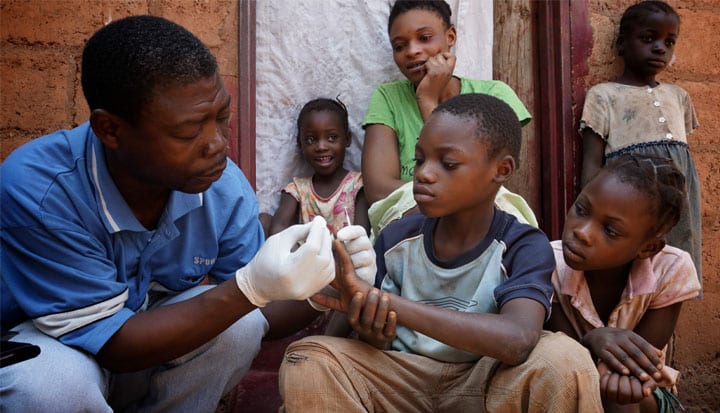Neglected Tropical Diseases (NTDs) seriously undermine the physical and cognitive health and economic opportunity of more than one billion people, most of them among the world’s poorest populations and least able to access or advocate for solutions. Although encouraging progress has been made in recent decades, the prevention, control, elimination and eradication of these diseases remain one of the great health equity challenges of our generation. Given their impact more broadly on nutrition, education, economic productivity, community resilience and health systems capacity, tackling them is crucial to ending extreme poverty and achieving the Sustainable Development Goals.
An imperative in addressing the challenge is how to align the necessary scientific expertise, assets and financial resources needed to discover and develop drugs to prevent or treat NTDs. Global pharmaceutical and biotechnology companies have these capabilities, but with few exceptions, they have little or no commercial rationale to invest in many years of research and development (R&D) to bring such drugs to market. And even then, the drugs still need to be made affordable, accessible and reliable for extremely poor patients in resource-constrained settings such as remote rural areas, urban slums and conflict zones. As a result, sustained efforts to discover, develop and deliver treatments for NTDs are not possible without new models of cooperation between public, private and nonprofit organizations.
From an R&D perspective, one of the most encouraging institutional innovations over the past 15 years has been the emergence of independent, nonprofit, often multi-stakeholder drug research organizations and alliances. These are facilitating new models of product development partnerships (PDPs) between companies, public and philanthropic donors, regulators, research institutes, universities, and governments and community organizations in endemic countries.
The emergence of these new types of PDPs has been accompanied by new models of corporate responsibility and shared value creation by some of the world’s leading pharmaceutical and biotechnology companies. In some cases, they are undertaking their own R&D in-house and/or exploring new licensing or pricing models for existing drugs and interventions. In others, they are supporting long-term product donations, capacity building and corporate philanthropy initiatives. A number are enabling some of their top scientists to volunteer their skills, time and assets to share compounds for screening, provide technical expertise, and offer pro-bono program enhancement support to non-profit research partners.
A new case study by the Corporate Responsibility Initiative at Harvard Kennedy School explores how AbbVie, a global, research-based biopharmaceutical company, is participating in joint efforts to tackle selected NTDs. Although the company currently has no existing products or commercial interest in discovering and developing drugs for NTDs, its senior management and scientists have committed to partner with other organizations to help them to undertake such research and to implement other initiatives to tackle NTDs. The case study focuses on examples of:
– Internal collaboration within the company, among different R&D teams and colleagues in technology licensing and collaborations, corporate responsibility, public affairs, and the corporate foundation.
– The leadership by individual scientists to turn an institutional commitment into action, by sharing their skills, expertise and time. This is in addition to sharing relevant compounds and supporting program enhancement through pro bono laboratory platforms and tests.
– Engagement between AbbVie’s scientists and several key product development partnerships, often alongside peers from other companies. Examples profiled are the Drugs for Neglected Diseases initiative, Medicines for Malaria Venture, TB Alliance, TB Drug Accelerator, Anti-Wolbachia Consortium, and Macrofilaricidal Drug Accelerator .
– Support for a student summer internship program, through the Franciscan Institute for World Health, to develop future scientific and leadership skills.
– AbbVie Foundation’s philanthropic support for community-based delivery, capacity building and evaluation programs led by MAP International and the Sabin Vaccine Institute in parts of Africa and Latin America.
– Participation in some of the multi-stakeholder platforms that have emerged to raise public awareness, support public advocacy, mobilize resources, and share knowledge, such as the Bill & Melinda Gates Foundation Health CEO Roundtable and the London Declaration Against NTDs.
As of 2016, some 160 of AbbVie’s top scientists have engaged in the company’s neglected diseases initiative. The company has shared more than 120,000 compounds with nonprofit research partners, and hundreds of scientific tests have been undertaken in its laboratories on their behalf. Lessons learned include: the potential of leveraging core expertise and capabilities from companies to tackle global challenges, even when there isn’t a direct commercial imperative to engage; the importance of sustaining senior executive support for such efforts, thinking outside institutional silos within the company, and taking time to build trust and shared understanding with external partners; and the untapped opportunity to explore non-competitive industry collaboration to achieve greater scale and systemic impact in tackling complex global health and development challenges.
The shared goal of combating NTDs to improve the health and economic prospects of over a billion of the world’s poorest people remains a complex and daunting one. Efforts to discover and develop new drugs and implement more collaborative approaches will take years, not months. Governments must take a lead, but companies and nonprofit organizations have a vital role to play. Dr. Dale Kempf, the AbbVie scientist who leads its neglected diseases initiative comments, “Only through committed long-term partnerships will we be likely to achieve significant victories against diseases that have devastated humankind for too long”. Such long-term partnerships are not easy to create or sustain. Yet, they offer one of our best hopes for tackling neglected diseases and improving the quality of peoples’ lives.
Download the report: https://www.hks.harvard.edu/centers/mrcbg/programs/cri










